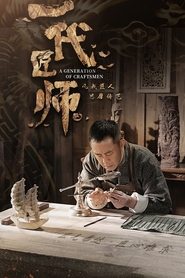Cctv 8 TV Series - Page 6
-
A Generation of Craftsmen
2023
star 4In 1911, during the Xinhai Revolution, the prestigious Liao family of woodcarvers faces a crisis when their craftsmanship is sabotaged. As they confront political and personal challenges, the eldest son, Liao Xi, embarks on a journey to protect his family and their legacy, finding unexpected allies along the way. -
Love in the Green Mountains
2023
After retiring from the special forces, Qin Xueliang returns to his hometown, determined to restore its environment and improve villagers’ lives. As the new village leader, he clashes with a wealthy businessman whose industries have caused severe pollution. Through perseverance and innovation, he earns the villagers’ trust, leads them toward prosperity, and finds his own happiness along the way. -
我的老爸是卧底
2016
我的老爸是卧底
2016
-
Who Is He
2023
star 7.5In 1988, criminal policeman Wei Guo Ping witnessed the deaths of his comrades during an operation around a serial murder case where the culprit escapes. This has left Wei Guo Ping scarred from the incident. Eight years later, the appalling corpse dismemberment case has shocked the city of Ningjiang. At this time, Wei Guo Ping has already grown into a seasoned police captain. -
Alliance
2023
star 6Lin Shuang, once a brilliant student at a top-tier university, ended up being a full-time mom. But she was betrayed and had to return to the workforce to fight for custody of her child. In her disheveled state, she met Gu Xu, her ex-classmate and now a talent from overseas. She confronted the challenges with Jiang Xi and Gu Xu, transforming into a professional from a homemaker, and fell in love with Gu Xu. Lin Shuang and Jiang Xi experienced personal growth, ushering in a new life of their own. -
Sisterhood
2023
star 5In the Nanyang region in the 1930s, Ouyang Tian Qing and Kuang Cai Yun traveled from Guangdong to Southeast Asia to make a living. Tianqing became the "samsui woman" of construction site labor and became the leader of the sisters. She was admired by both the rich Jia Fu and the poor A Le. Cai Yun accidentally became acquainted with the young Hu Yaozu and became the nanny but was repeatedly bullied by the Hu family. Yao Zu drove her away to protect her and went to study abroad. A Le took the initiative to give up his feelings for Tian Qing and went to serve as a soldier during the Japanese invasion. The Japanese forces forced Tian Qing and her company to build the shrine. On the day of completion, A Le, who joined the rebels, led the people to rescue Tian Qing and burned down the shrine. Cai Yun, who suffered various changes, also waited for the return of Yao Zu. -
The Story of a Noble Family
2003
star 7.6The Story of a Noble Family (Chinese: 金粉世家) is a 2003 Chinese television series based on Zhang Henshui's novel Jinfen Shijia, directed by Li Dawei. The series was first broadcast in 2003 on China Central Television in mainland China. -
汗血宝马
2005
汗血宝马
2005
-
绝地刀锋
2015
绝地刀锋
2015
-
Flesh And Spirit
2018
Flesh And Spirit
2018
-
The Heart of Genius
2022
star 6.9A mysterious mathematical formula accidentally took Lin Chaoqi to a parallel world when she was 13 years old. In this strange adventure, with the previous years of accumulated experience in the Olympiad competition Lin Chaoqi with a buff suddenly found that those who had let down the time, abandoned beliefs, unfinished dreams, missed ties, and even her father's incurable disease, as she enters this alternate universe, everything can be made up for. Even those who have the worst possible starting point, there is still infinite possibilities. -
侯天明的梦
2015
侯天明的梦
2015
-
辛追传奇
2007
辛追传奇
2007
-
The Great Revival
2007
star 9The Great Revival, also known as Wo Xin Chang Dan, is a Chinese television series based on the conflict between the Yue and Wu states during the Spring and Autumn Period of Chinese history. The Chinese title of the series comes from a Chinese idiom derived from King Goujian of Yue's perseverance in overcoming the odds to revive his fallen state of Yue and conquer the rival state of Wu. The series was first broadcast on CCTV-8 in mainland China in January 2007.



















